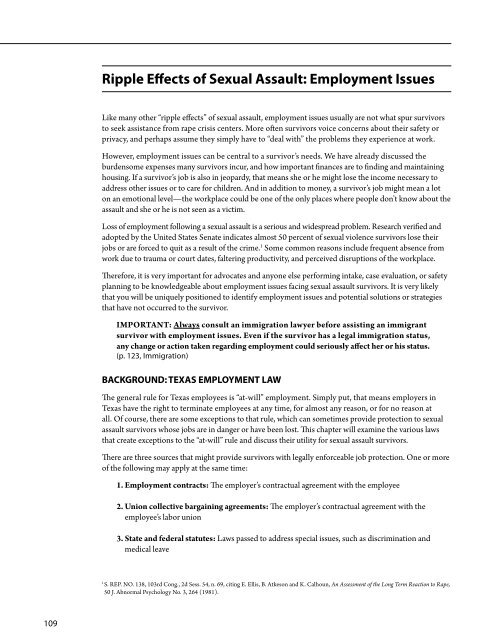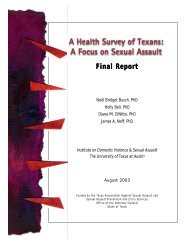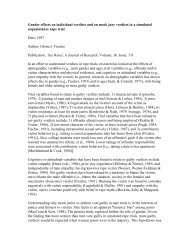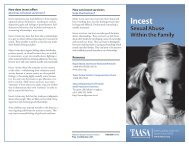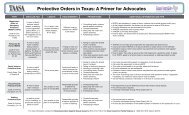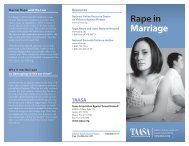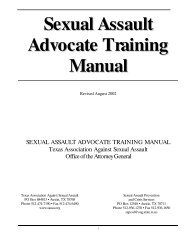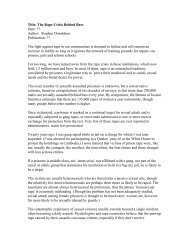Sexual aSSault LEGAL ADVOCACY MANUAL - Texas Association ...
Sexual aSSault LEGAL ADVOCACY MANUAL - Texas Association ...
Sexual aSSault LEGAL ADVOCACY MANUAL - Texas Association ...
You also want an ePaper? Increase the reach of your titles
YUMPU automatically turns print PDFs into web optimized ePapers that Google loves.
Ripple Effects of <strong>Sexual</strong> Assault: Employment Issues<br />
Like many other “ripple effects” of sexual assault, employment issues usually are not what spur survivors<br />
to seek assistance from rape crisis centers. More often survivors voice concerns about their safety or<br />
privacy, and perhaps assume they simply have to “deal with” the problems they experience at work.<br />
However, employment issues can be central to a survivor’s needs. We have already discussed the<br />
burdensome expenses many survivors incur, and how important finances are to finding and maintaining<br />
housing. If a survivor’s job is also in jeopardy, that means she or he might lose the income necessary to<br />
address other issues or to care for children. And in addition to money, a survivor’s job might mean a lot<br />
on an emotional level—the workplace could be one of the only places where people don’t know about the<br />
assault and she or he is not seen as a victim.<br />
Loss of employment following a sexual assault is a serious and widespread problem. Research verified and<br />
adopted by the United States Senate indicates almost 50 percent of sexual violence survivors lose their<br />
jobs or are forced to quit as a result of the crime. 1 Some common reasons include frequent absence from<br />
work due to trauma or court dates, faltering productivity, and perceived disruptions of the workplace.<br />
Therefore, it is very important for advocates and anyone else performing intake, case evaluation, or safety<br />
planning to be knowledgeable about employment issues facing sexual assault survivors. It is very likely<br />
that you will be uniquely positioned to identify employment issues and potential solutions or strategies<br />
that have not occurred to the survivor.<br />
IMPORTANT: Always consult an immigration lawyer before assisting an immigrant<br />
survivor with employment issues. Even if the survivor has a legal immigration status,<br />
any change or action taken regarding employment could seriously affect her or his status.<br />
(p. 123, Immigration)<br />
Background: <strong>Texas</strong> Employment Law<br />
The general rule for <strong>Texas</strong> employees is “at-will” employment. Simply put, that means employers in<br />
<strong>Texas</strong> have the right to terminate employees at any time, for almost any reason, or for no reason at<br />
all. Of course, there are some exceptions to that rule, which can sometimes provide protection to sexual<br />
assault survivors whose jobs are in danger or have been lost. This chapter will examine the various laws<br />
that create exceptions to the “at-will” rule and discuss their utility for sexual assault survivors.<br />
There are three sources that might provide survivors with legally enforceable job protection. One or more<br />
of the following may apply at the same time:<br />
1. Employment contracts: The employer’s contractual agreement with the employee<br />
2. Union collective bargaining agreements: The employer’s contractual agreement with the<br />
employee’s labor union<br />
3. State and federal statutes: Laws passed to address special issues, such as discrimination and<br />
medical leave<br />
1<br />
S. <br />
REP. NO. 138, 103rd Cong., 2d Sess. 54, n. 69, citing E. Ellis, B. Atkeson and K. Calhoun, An Assessment of the Long Term Reaction to Rape,<br />
50 J. Abnormal Psychology No. 3, 264 (1981).<br />
109


